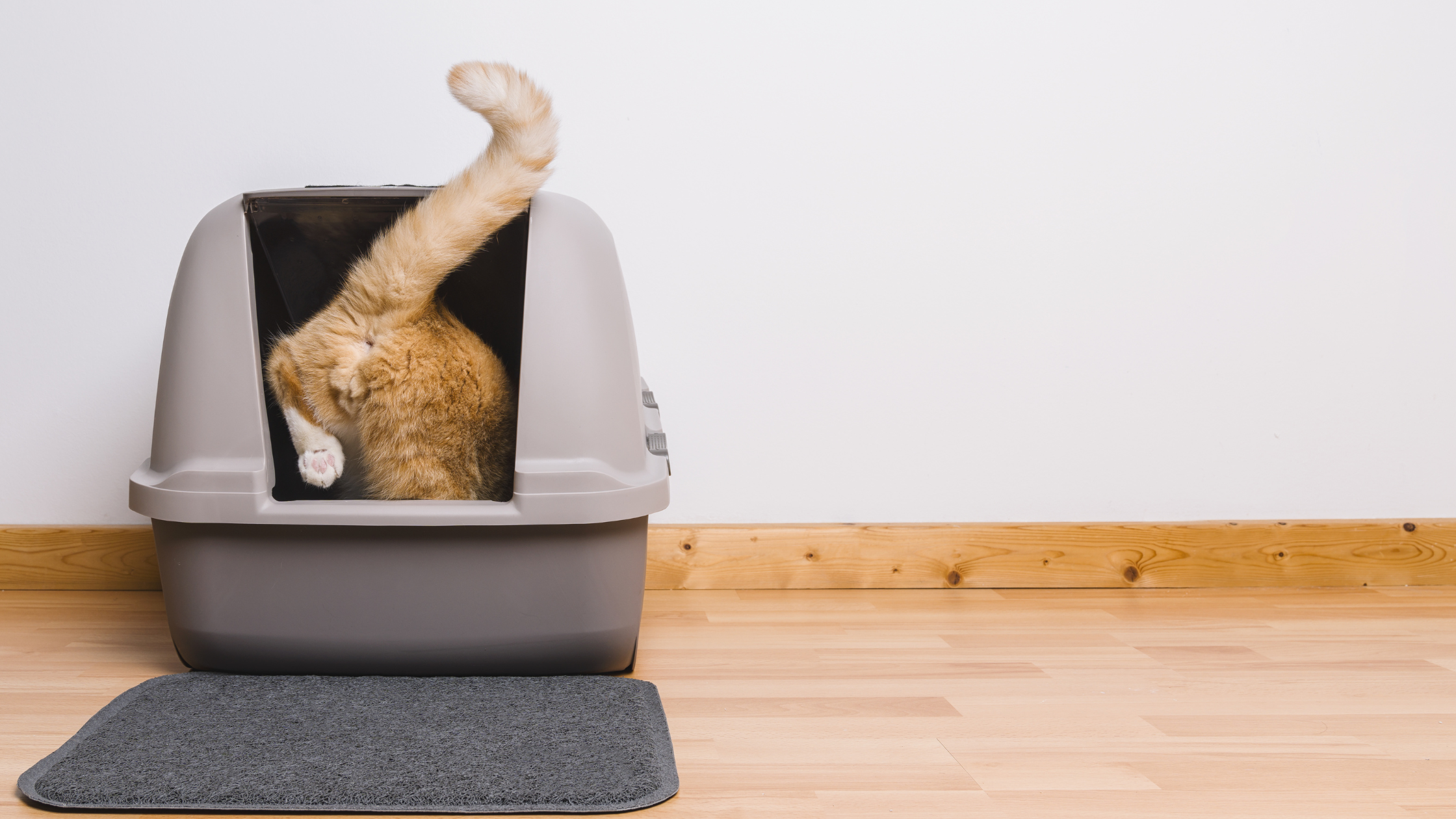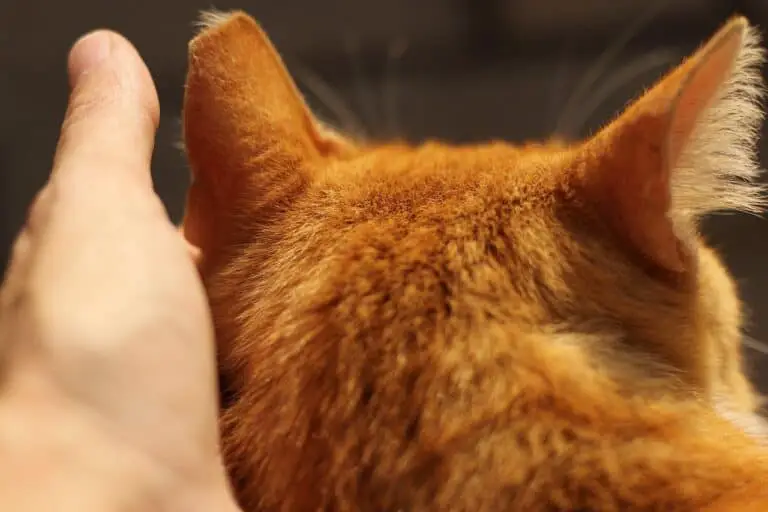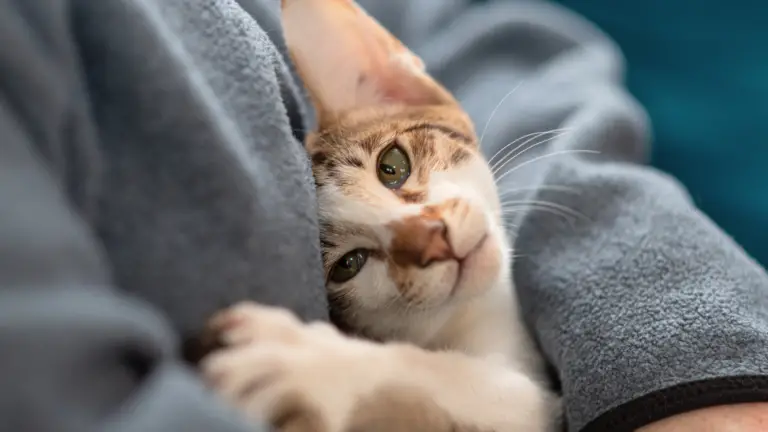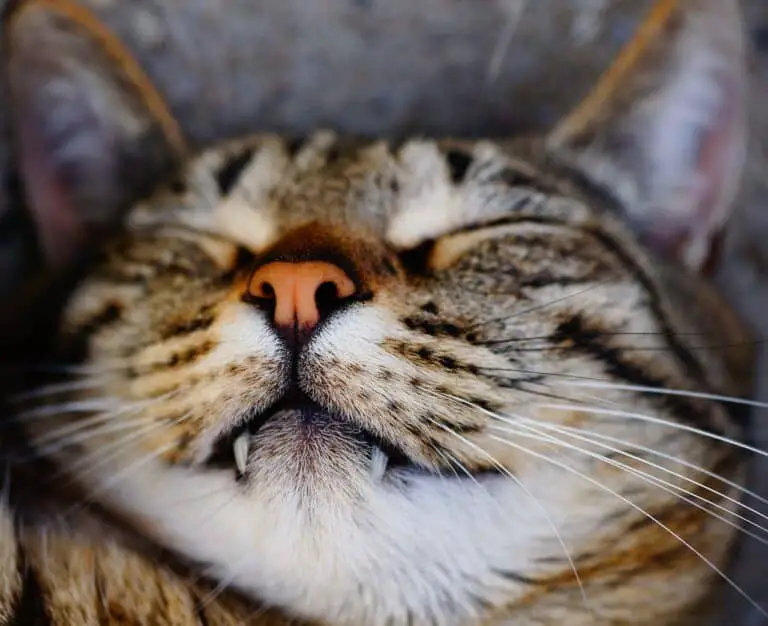WHY IS MY CAT SLEEPING IN THE LITTER BOX?
Why is my cat sleeping in the litter box? While some cats may occasionally rest in the litter box, spending a lot of time there or consistently sleeping, there can be a sign of a problem.
If your cat sleeps in the litter box, it could be due to several factors. It may be a sign that your cat is experiencing discomfort or pain or that they are feeling stressed or anxious. It could also be due to a dirty litter box or a dislike of the litter itself.

WHY IS MY CAT SLEEPING IN THE LITTER BOX?
If you notice your cat sleeping in the litter box frequently, it’s important to monitor their behavior and take steps to address any underlying issues to ensure your cat’s health and well-being.
It’s important to address this behavior by identifying and addressing the underlying cause. This may involve cleaning the litter box more frequently, changing the type of litter or litter box, providing a comfortable alternative resting place, or seeking veterinary attention if necessary.
There can be several reasons why a cat may start sleeping in their litter box. Some of the most common reasons include the following:
1. MEDICAL ISSUES
If your cat suddenly starts sleeping in the litter box, it’s important to rule out any underlying medical conditions that could be causing discomfort or pain. For example, urinary tract infections or digestive issues could make it painful for your cat to urinate or defecate, leading them to seek out the litter box for comfort.
2. ANXIETY OR STRESS
Cats may also seek out the litter box as a safe and secure place to hide if they feel anxious or stressed. For example, changes in the household, such as the addition of a new pet or a change in routine, can trigger anxiety in cats and cause them to seek shelter in the litter box.
3. TERRITORIAL BEHAVIOR
Some cats may view the litter box as their territory and may sleep in it to defend their space from other pets in the household.
4. COMFORT
Finally, some cats may find the litter box to be a comfortable place to sleep, especially if it’s warm and cozy.
OLDER CAT SLEEPING IN THE LITTER BOX – WHY?
If your older cat suddenly starts sleeping in their litter box, it’s important to consider several possible explanations. Some potential causes could include the following:
1. MEDICAL ISSUES
Older cats are more prone to certain health conditions, such as arthritis or kidney disease, which could make accessing the litter box difficult. In addition, if your cat is sleeping in the litter box, it may be experiencing discomfort or pain when trying to climb in and out of the box.
2. COGNITIVE DECLINE
As cats age, they may experience cognitive decline or dementia. This can cause changes in behavior, including disorientation and confusion. For example, your cat may feel more comfortable and secure sleeping in the litter box as it is a familiar and safe place for them.
3. STRESS OR ANXIETY
Older cats may experience stress or anxiety due to changes in their environment, such as adding a new pet or moving to a new home. Sleeping in the litter box may be a way for them to seek out a secure and enclosed space.
4. LACK OF LITTER ACCESS
Lack of litter box access: Older cats may have difficulty accessing the litter box if it is located in an area difficult for them to reach. This may cause them to sleep in the litter box to keep it close and accessible.
SICK CAT SLEEPING IN THE LITTER BOX – WHY?
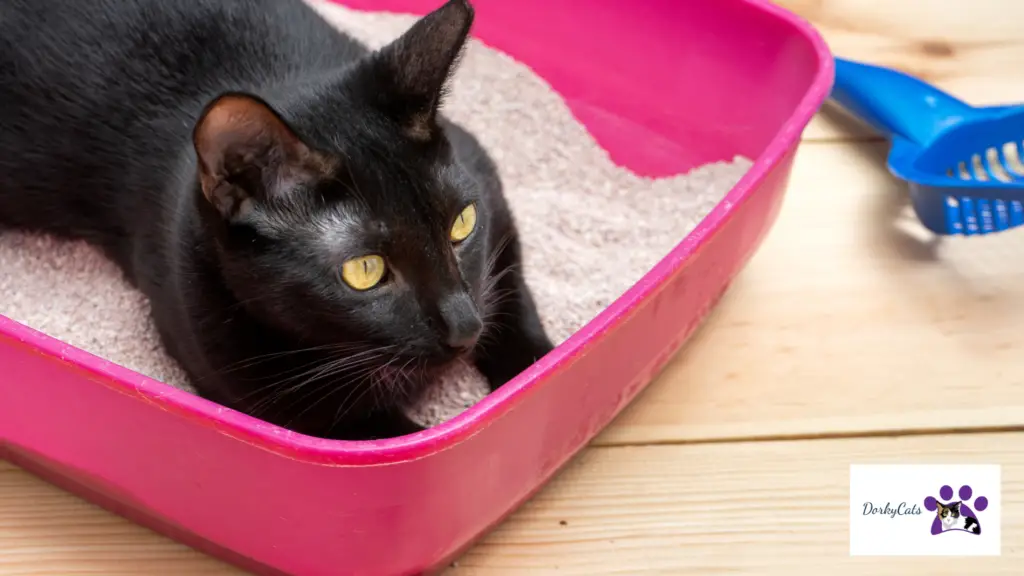
If your cat is sick and sleeping in the litter box, it’s important to address the underlying cause of the behavior as soon as possible.
Some potential causes could include the following:
URINARY TRACT INFECTION
Cats with urinary tract infections may feel the need to urinate more frequently and may experience pain or discomfort when urinating. This may cause them to seek out the litter box as a place to relieve themselves and as a source of comfort.
GASTROINTESTINAL ISSUES
Cats with gastrointestinal issues, such as diarrhea or constipation, may also seek out the litter box to relieve themselves and feel more comfortable sleeping in it.
DEHYDRATION
Sick cats may become dehydrated and seek out the litter box as a source of moisture. If your cat is sleeping in the litter box and not drinking water, it’s important to address dehydration immediately.
PAIN OR DISCOMFORT
Sick cats may also seek out the litter box as a place to rest and find comfort if they are experiencing pain or discomfort.
If your cat is sick and sleeping in the litter box, it’s important to consult with a veterinarian as soon as possible.
The veterinarian can thoroughly examine any underlying medical issues and develop an appropriate treatment plan. In some cases, the behavior may resolve on its own once the underlying medical problem has been addressed.
CAT SITTING IN LITTER BOX DOING NOTHING – WHY?
If your cat is sitting in the litter box but not using it to urinate or defecate, there could be several potential reasons:
- Litter box aversion: If your cat avoids using the litter box, they may still go into it and sit for a while, but they won’t actually use it. This could be due to several factors, such as the litter box being too dirty or not being in a location your cat finds acceptable.
- Medical issues: Some medical problems can cause your cat to spend more time in the litter box. For example, suppose your cat has a urinary tract infection or constipation. In that case, they may sit in the litter box as they associate it with going to the toilet, but they may not be able to actually go.
- Stress or anxiety: If your cat is experiencing stress or anxiety, it may seek out the litter box as a safe, enclosed space. This could be due to environmental changes, such as adding a new pet or moving to a new home.
- Territorial behavior: Cats can be territorial animals. If they feel another cat or pet threatens their territory, they may sit in the litter box to guard it.
DYING CAT SLEEPING IN THE LITTER BOX – WHY?
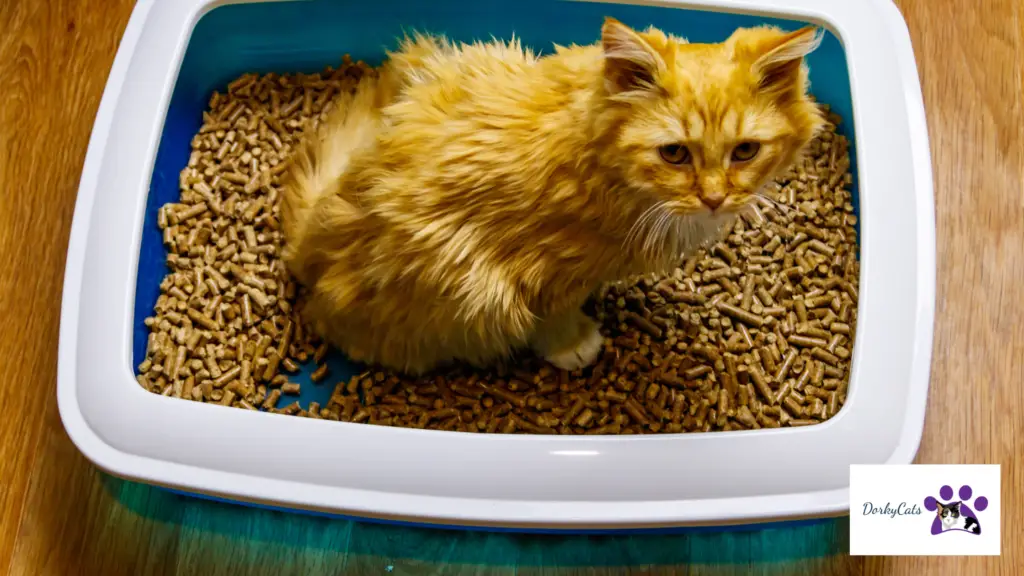
If your cat is terminally ill or in the final stages of life, it may seek out the litter box as a place to rest and find comfort. This is common in dying cats, who may feel vulnerable and seek out a familiar, enclosed space.
However, it is important to ensure your cat is comfortable and has everything they need during this difficult time.
Ensure they can access food, water, and a comfortable resting place. You may also want to consider providing a soft blanket or towel for them to lie on in the litter box, as this can help provide some additional comfort.
It’s also essential to keep the litter box clean, as a dirty litter box can cause discomfort and may exacerbate any medical issues your cat is experiencing. Try to scoop the litter box several times a day and completely replace the litter at least once a week.
HOW DO I STOP MY CAT FROM SLEEPING IN THE LITTER BOX?
If your cat is sleeping in the litter box, there could be several reasons for this behavior. Here are a few things you can try to discourage your cat from sleeping in the litter box:
PROVIDE A COMFORTABLE ALTERNATIVE
Ensure your cat has a comfortable resting place, not in the litter box. Consider providing a cozy bed or cat tree in a quiet area of your home.
KEEP THE LITTER BOX CLEAN
If your cat spends more time in the litter box than necessary, it may be due to discomfort or aversion caused by a dirty litter box. Try to scoop the litter box at least once a day and replace the litter frequently.
CHANGE THE LITTER
Some cats may oppose certain types of litter, so it’s worth trying a different type to see if this makes a difference. You can also try providing a different kind of litter box, such as one with a hood or a larger size.
MEDICAL ISSUES
Address any underlying medical issues. For example, if your cat spends much time in the litter box, it could indicate an underlying medical issue. Taking your cat to the vet to rule out potential health problems is essential.
ADDRESS STRESS OR ANXIETY
If your cat spends more time in the litter box due to stress or anxiety, it’s essential to identify and address the underlying cause. For example, this could be caused by environmental changes or other pets’ presence in the home.
Consider providing your cat with a safe and quiet space away from other pets or using pheromone products to help reduce stress.
Remember that finding a solution that works for your cat may take some time and experimentation. So be patient and persistent, and continue monitoring your cat’s behavior to ensure they are comfortable and happy.
LEGGI ANCHE: 9 BEST AUTOMATIC LITTER BOXES TO TRY!

